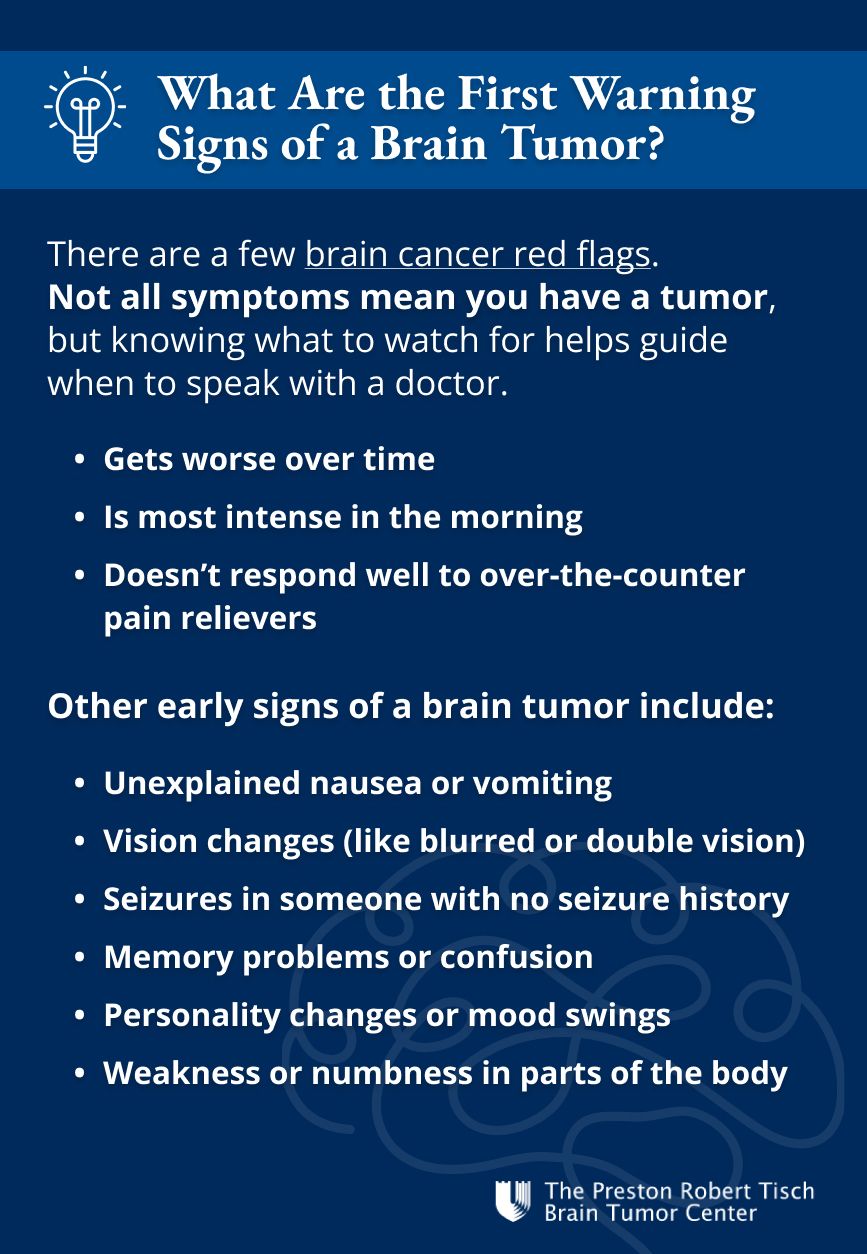
Have you ever wondered how long a brain tumor can grow without making itself known? It's a common and important question, especially because brain tumor symptoms aren’t always obvious.
At the Preston Robert Tisch Brain Tumor Center at Duke, we understand how confusing and scary this uncertainty can feel. Let’s explore the subtle symptoms of brain cancer, types of tumors, and how to know when it’s time to seek medical attention.
What Is a Brain Tumor?
A brain tumor is an abnormal growth of cells within or around the brain. Some are benign (non-cancerous) and grow slowly, while others are malignant (cancerous) and may spread more rapidly. Where the tumor forms and how it grows can affect everything, from symptoms to treatment options.
➡️ Want a deeper dive into brain tumors? Read our blog: Everything You Need to Know About Brain Cancer.
How Long Can a Brain Tumor Go Undetected?
The short answer: it depends. Some brain tumors can be present for years without symptoms, especially if they’re slow-growing or located in areas that don’t directly affect brain function.
Unseen Progression
Many patients have tumors that grow silently. Symptoms of brain tumors often show up only after the tumor has grown large enough to interfere with nearby tissue. This delay in symptoms can mean a tumor goes undetected for months or even years.
Tumor Type Matters
- Glioblastoma symptoms often appear quickly (within 3 to 6 months) because this tumor type is fast-growing and aggressive.
- Low-grade astrocytomas can develop quietly over many years before producing any noticeable changes.
- Benign tumors like meningiomas may remain dormant for years, slowly growing until they begin to press against parts of the brain and cause symptoms.
What Are the First Warning Signs of a Brain Tumor?
There are a few brain cancer red flags. Not all symptoms mean you have a tumor, but knowing what to watch for helps guide when to speak with a doctor. The most common early symptom is a persistent headache, more specifically if it:
- Gets worse over time
- Is most intense in the morning
- Doesn’t respond well to over-the-counter pain relievers
Other early signs of a brain tumor include:
- Unexplained nausea or vomiting
- Vision changes (like blurred or double vision)
- Seizures in someone with no seizure history
- Memory problems or confusion
- Personality changes or mood swings
- Weakness or numbness in parts of the body
➡️ Want to learn more about the frontal lobe? Read our blog: What Are the Symptoms of a Frontal Lobe Brain Tumor?

Can You Have a Brain Tumor for Years and Not Know?
Yes. Some brain tumors grow so slowly that they don’t show symptoms for a long time. Meningiomas, for example, can grow unnoticed for years. Their symptoms might be vague, like fatigue or memory issues, and often get dismissed as stress or aging.
This is why regular checkups and open conversations with your doctor about any persistent or unexplained changes are so important. Trust your instincts if something feels “off.”
What Can Be Mistaken for a Brain Tumor?
Some conditions mimic symptoms of brain tumors, which is why a clear diagnosis from a specialist is critical. Conditions that may cause similar symptoms include:
- Migraines or chronic headaches
- Stroke or mini-strokes
- Multiple sclerosis (MS)
- Inner ear disorders (which can affect balance)
- Anxiety or panic disorders
- Lyme disease
- Dementia
Only advanced imaging like an MRI can help confirm the presence of a tumor. But that brings us to the next common question.
Can an MRI Miss a Brain Tumor?
MRIs are the gold standard for diagnosing brain tumors, especially when enhanced with contrast dye. While rare, certain small tumors or those located in hard-to-scan areas may be missed. If symptoms persist and your MRI is clear, your care team may recommend additional testing or follow-up imaging.
What To Do if You Think You Might Have a Brain Tumor
First, don’t panic—but don’t ignore the symptoms either. If you’ve been experiencing headaches, vision changes, or cognitive issues that aren’t improving, contact your doctor. If needed, your physician can refer you to a neurologist or your team of neuro-oncology doctors.
At The Preston Robert Tisch Brain Tumor Center, we’ll conduct a thorough evaluation and create a care plan that works for you, whether that involves imaging, biopsies, or referrals for further testing.
Brain Cancer Treatment and Support at Duke
Choosing where to seek care makes a difference. At the Tisch Brain Tumor Center, we offer:
- Personalized treatment plans for every tumor type
- Access to cutting-edge clinical trials
- A supportive, compassionate care team
- Nationally recognized neuro-oncologists
Our goal is to help you understand your options and feel confident in your next step—whatever that looks like for you.
👉 Explore our Adult Neuro-Oncology Program
👉 Schedule a consultation
👉 Read more on our blog
Related Readings:
- What Happens If a Benign Tumor Is Left Untreated?
- Which is Better for Brain Imaging: MRI vs CT Scan
- Do Brain Tumors Show Up In Blood Work?
FAQ: Common Questions About Brain Tumor Symptoms
1. Can you have a brain tumor for years without knowing?
Yes. Slow-growing tumors may not show symptoms for years. Many are found only when they begin to affect nearby brain tissue.
2. Can an MRI miss a brain tumor?
While uncommon, some small or hidden tumors may be missed on initial scans. Persistent symptoms may require follow-up imaging or tests.
3. How do you self-check for a brain tumor?
There’s no reliable way to self-diagnose a brain tumor. If you have persistent neurological symptoms, see a healthcare provider for evaluation.
4. What can be mistaken for a brain tumor?
Migraines, strokes, MS, and anxiety can mimic tumor symptoms. Accurate diagnosis requires a neurological exam and imaging.